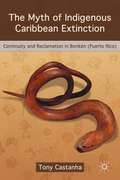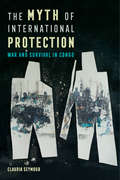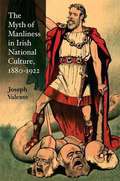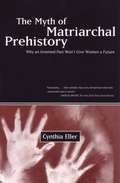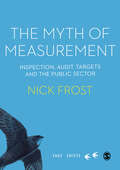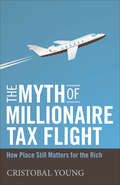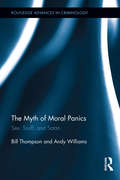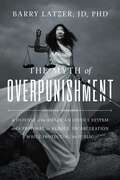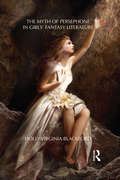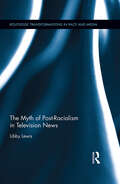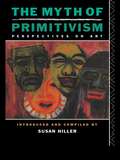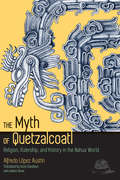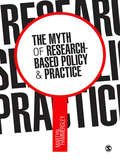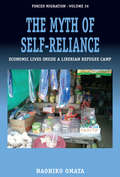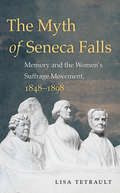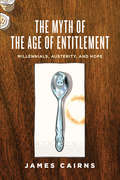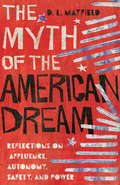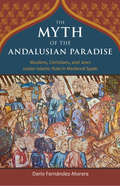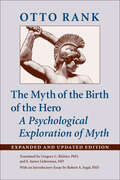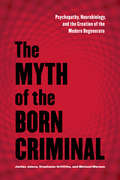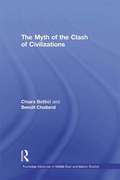- Table View
- List View
The Myth of Indigenous Caribbean Extinction
by Tony CastanhaThis book debunks one of the greatest myths ever told in Caribbean history: that the indigenous peoples who encountered a very lost Christopher Columbus are 'extinct. ' Through the uncovering of recent ethnographical data, the author reveals extensive narratives of Jíbaro Indian resistance and cultural continuity on the island of Borikén.
The Myth of Indigenous Caribbean Extinction: Continuity and Reclamation in Borikén (Puerto Rico)
by T. CastanhaThis book debunks one of the greatest myths ever told in Caribbean history: that the indigenous peoples who encountered a very lost Christopher Columbus are 'extinct.' Through the uncovering of recent ethnographical data, the author reveals extensive narratives of Jíbaro Indian resistance and cultural continuity on the island of Borikén.
The Myth of International Protection: War and Survival in Congo (California Series in Public Anthropology #43)
by Claudia SeymourIn this viscerally intense, ethnographically based work, Claudia Seymour relates the heart-wrenching stories of young people in the Democratic Republic of Congo—young people who live on the front lines of conflict, in neighborhoods and villages destroyed by war, and on the streets in conditions of poverty and destitution. Seymour, a former child protection adviser and human rights investigator for the United Nations, chronicles her personal journey, which begins with the will to do good yet ends with the realization of how international aid can contribute to greater harm than good. The idea of protection and universalized human rights is turned on its head as Seymour uncovers the complicities and hypocrisies of the aid world. In the promotion of “inalienable human rights,” aid organizations ignore the complex historical and socioeconomic dynamics that lead to the violations of such rights. Offering a new perspective, The Myth of International Protection reframes how the world sees the DRC and urges global audiences to consider their own roles in fueling the DRC’s seemingly endless violence.In this viscerally intense, ethnographically-based work, Claudia Seymour, a former child protection advisor and human rights investigator for the United Nations, chronicles the heart-wrenching stories of young people in the Democratic Republic of Congo—young people who live on the front lines of conflict, in neighborhoods and villages destroyed by war, and on the streets in conditions of poverty and destitution. Seymour shares her personal journey, one that begins with the will to do good yet ends with the realization of how international aid can contribute to greater harm than good. The idea of protection and universalized human rights is turned on its head as Seymour uncovers the complicities and hypocrisies of the aid world—that in its promotion of “inalienable human rights”, the complex historical and socio-economic dynamics that lead to the violations of such rights are ignored. The Myth of International Protection offers a new perspective to reframe how the world sees the DRC, and urges global audiences to consider their own roles in fueling the DRC’s seemingly endless violence.
The Myth of Making It: A Workplace Reckoning
by Samhita MukhopadhyayWe can bury the girlboss, but what comes next? The former executive editor of Teen Vogue tells the story of her personal workplace reckoning and argues for collective responsibility to reimagine work as we know it.&“One of the smartest voices we have on gender, power, capitalist exploitation, and the entrenched inequities of the workplace.&”—Rebecca Traister, author of Good and Mad&“As I sat in the front row that day, I was 80 percent faking it with a 100-percent-real Gucci bag.&” Samhita Mukhopadhyay had finally made it: she had her dream job, dream clothes—dream life. But time and time again, she found herself sacrificing time with family and friends, paying too much for lattes, and limping home after working twelve hours a day. Success didn&’t come without costs, right? Or so she kept telling herself. And Mukhopadhyay wasn&’t alone: Far too many of us are taught that we need to work ourselves to the bone to live a good life. That we just need to climb up the corporate ladder, to &“lean in&” and &“hustle,&” to enact change. But as Mukhopadhyay shows, these definitions of success are myths—and they are seductive ones.Mukhopadhyay traces the origins of these myths, taking us from the sixties to the present. She forms a critical overview of workplace feminism, looking at stories from her own professional career, analysis from activists and experts, and of course, experiences of workers at different levels. As more individuals continue to question whether their professional ambitions can lead to happiness and fulfillment in the first place, Mukhopadhyay asks, What would it mean to have a liberated workplace? Mukhopadhyay emerges with a vision for a workplace culture that pays fairly, recognizes our values, and gives people access to the resources they need.A call to action to redefine and reimagine work as we know it, The Myth of Making It is a field guide and manifesto for all of us who are tired, searching for justice, and longing to be liberated from the oppressive grip of hustle culture.
The Myth of Manliness in Irish National Culture, 1880-1922
by Joseph ValenteThis study aims to supply the first contextually precise account of the male gender anxieties and ambivalences haunting the culture of Irish nationalism in the period between the Act of Union and the founding of the Irish Free State. To this end, Joseph Valente focuses upon the Victorian ethos of manliness or manhood, the specific moral and political logic of which proved crucial to both the translation of British rule into British hegemony and the expression of Irish rebellion as Irish psychomachia. The influential operation of this ideological construct is traced through a wide variety of contexts, including the career of Ireland's dominant Parliamentary leader, Charles Stewart Parnell; the institutions of Irish Revivalism--cultural, educational, journalistic, and literary; the writings of both canonical authors (Yeats, Synge, Gregory, and Joyce) and subcanonical authors (James Stephens, Patrick Pearse, Lennox Robinson); and major political movements of the time, including suffragism, Sinn Fein, Na Fianna E Éireann, and the Volunteers. The construct of manliness remains very much alive today, underpinning the neo-imperialist marriage of ruthless aggression and the sanctities of duty, honor, and sacrifice. Mapping its earlier colonial and postcolonial formations can help us to understand its continuing geopolitical appeal and danger.
The Myth of Matriarchal Prehistory: Why an Invented Past Will Not Give Women a Future
by Cynthia EllerAccording to the myth of matriarchal prehistory, men and women lived together peacefully before recorded history. Society was centered around women, with their mysterious life-giving powers, and they were honored as incarnations and priestesses of the Great Goddess. Then a transformation occurred, and men thereafter dominated society. Given the universality of patriarchy in recorded history, this vision is understandably appealing for many women. But does it have any basis in fact? And as a myth, does it work for the good of women? Cynthia Eller traces the emergence of the feminist matriarchal myth, explicates its functions, and examines the evidence for and against a matriarchal prehistory. Finally, she explains why this vision of peaceful, woman-centered prehistory is something feminists should be wary of.
The Myth of Measurement: Inspection, audit, targets and the public sector (SAGE Swifts)
by Nick FrostIn the public sector inspection regimes and performance targets provide a powerful and dominant narrative, often placing pressure on professionals and organisations to continuously quantify the quality of services and to achieve targets. This book explores the background, development, techniques and impact of such regimes across areas of the public sector including schools, universities, police forces, children’s services and health services. Putting inspection and audit regimes under scrutiny, the author questions their role and function across these organisations and builds a persuasive critical argument for the re-thinking of public accountability mechanisms and techniques.
The Myth of Measurement: Inspection, audit, targets and the public sector (SAGE Swifts)
by Nick FrostIn the public sector inspection regimes and performance targets provide a powerful and dominant narrative, often placing pressure on professionals and organisations to continuously quantify the quality of services and to achieve targets. This book explores the background, development, techniques and impact of such regimes across areas of the public sector including schools, universities, police forces, children’s services and health services. Putting inspection and audit regimes under scrutiny, the author questions their role and function across these organisations and builds a persuasive critical argument for the re-thinking of public accountability mechanisms and techniques.
The Myth of Millionaire Tax Flight: How Place Still Matters for the Rich (Studies in Social Inequality)
by Cristobal YoungIn this age of globalization, many countries and U.S. states are worried about the tax flight of the rich. As income inequality grows and U.S. states consider raising taxes on their wealthiest residents, there is a palpable concern that these high rollers will board their private jets and fly away, taking their wealth with them. Many assume that the importance of location to a person's success is at an all-time low. Cristobal Young, however, makes the surprising argument that location is very important to the world's richest people. Frequently, he says, place has a great deal to do with how they make their millions. In The Myth of Millionaire Tax Flight, Young examines a trove of data on millionaires and billionaires—confidential tax returns, Forbes lists, and census records—and distills down surprising insights. While economic elites have the resources and capacity to flee high-tax places, their actual migration is surprisingly limited. For the rich, ongoing economic potential is tied to the place where they become successful—often where they are powerful insiders—and that success ultimately diminishes both the incentive and desire to migrate. This important book debunks a powerful idea that has driven fiscal policy for years, and in doing so it clears the way for a new era. Millionaire taxes, Young argues, could give states the funds to pay for infrastructure, education, and other social programs to attract a group of people who are much more mobile—the younger generation.
The Myth of Moral Panics: Sex, Snuff, and Satan (Routledge Advances in Criminology #14)
by Andy Williams Bill ThompsonThis study provides a comprehensive critique - forensic, historical, and theoretical - of the moral panic paradigm, using empirically grounded ethnographic research to argue that the panic paradigm suffers from fundamental flaws that make it a myth rather than a viable academic perspective.
The Myth of Overpunishment: A Defense of the American Justice System and a Proposal to Reduce Incarceration While Protecting the Public
by Barry Latzer Tom CottonJustice is on trial in the United States.From police to prisons, the justice system is accused of overpunishing. It is said that too many Americans are abused by the police, arrested, jailed, and imprisoned. But the denunciations are overblown. The data indicates, contrary to the critics, that we don&’t imprison too many, nor do we overpunish. This becomes evident when we examine the crimes of prisoners and the actual time served. The history of punishment in the United States, discussed in vivid detail, reveals that the treatment of offenders has become progressively more lenient. Corporal punishment is no more. The death penalty has become a rarity. Many convicted defendants are given no-incarceration sentences. Restorative justice may be a good thing for low-level offenses, or as an add-on for remorseful prisoners, but when it comes to major crimes it is no substitute for punitive justice. The Myth of Overpunishment presents a workable and politically feasible plan to electronically monitor arrested suspects prior to adjudication (bail reform), defendants placed on probation, and parolees.
The Myth of Persephone in Girls' Fantasy Literature (Children's Literature and Culture)
by Holly BlackfordIn this book, Blackford historicizes the appeal of the Persephone myth in the nineteenth century and traces figurations of Persephone, Demeter, and Hades throughout girls’ literature of the nineteenth and twentieth centuries. She illuminates developmental patterns and anxieties in E. T. A. Hoffmann’s Nutcracker and Mouse King, Louisa May Alcott’s Little Women, Emily Brontë’s Wuthering Heights, J. M. Barrie’s Peter and Wendy, Frances Hodgson Burnett’s The Secret Garden, E. B. White’s Charlotte’s Web, J. K. Rowling’s Harry Potter and the Chamber of Secrets, Stephenie Meyer’s Twilight, and Neil Gaiman’s Coraline. The story of the young goddess’s separation from her mother and abduction into the underworld is, at root, an expression of ambivalence about female development, expressed in the various Neverlands through which female protagonists cycle and negotiate a partial return to earth. The myth conveys the role of female development in the perpetuation and renewal of humankind, coordinating natural and cultural orders through a hieros gamos (fertility coupling) rite. Meanwhile, popular novels such as Twilight and Coraline are paradoxically fresh because they recycle goddesses from myths as old as the seasons. With this book, Blackford offers a consideration of how literature for the young squares with broader canons, how classics flexibly and uniquely speak through novels that enjoy broad appeal, and how female traditions are embedded in novels by both men and women.
The Myth of Post-Racialism in Television News (Routledge Transformations in Race and Media)
by Libby LewisThis book explores the written and unwritten requirements Black journalists face in their efforts to get and keep jobs in television news. Informed by interviews with journalists themselves, Lewis examines how raced Black journalists and their journalism organizations process their circumstances and choose to respond to the corporate and institutional constraints they face. She uncovers the social construction and attempted control of "Blackness" in news production and its subversion by Black journalists negotiating issues of objectivity, authority, voice, and appearance along sites of multiple differences of race, gender, and sexuality.
The Myth of Primitivism
by Susan HillerThis book explores the fusion of myth, history and geography which leads to ideas of primitivism, and looks at their construction, interpretation and consumption in Western culture. Contextualized by Susan Hiller's introductions to each section, discussions range from the origins of cultural colonialism to eurocentric ideas of primitive societies, including the use of primitive culture in constructing national identities, and the appropriation of primitivist imagery in modernist art. The result is a controversial critique of art theory, practice and politics, and a major enquiry into the history of primitivism and its implications for contemporary culture.
The Myth of Quetzalcoatl: Religion, Rulership, and History in the Nahua World
by Alfredo López AustinThe Myth of Quetzalcoatl is a translation of Alfredo López Austin’s 1973 book Hombre-Dios: Religión y politica en el mundo náhuatl. Despite its pervasive and lasting influence on the study of Mesoamerican history, religion in general, and the Quetzalcoatl myth in particular, this work has not been available in English until now. The importance of Hombre-Dios and its status as a classic arise from its interdisciplinary approach, creative use of a wide range of source material, and unsurpassed treatment of its subject—the nature and content of religious beliefs and rituals among the native populations of Mesoamerica and the manner in which they fused with and helped sanctify political authority and rulership in both the pre- and post-conquest periods. Working from a wide variety of previously neglected documentary sources, incorporating myth, archaeology, and the ethnography of contemporary Native Americans including non-Nahua peoples, López Austin traces the figure of Quetzalcoatl as a “Man-God” from pre-conquest times, while Russ Davidson’s translator’s note, Davíd Carrasco's foreword, and López Austin’s introduction place the work within the context of modern scholarship. López Austin’s original work on Quetzalcoatl is a pivotal work in the field of anthropology, and this long-overdue English translation will be of significance to historians, anthropologists, linguists, and serious readers interested in Mesoamerica.
The Myth of Race: The Troubling Persistence of an Unscientific Idea
by Robert Wald SussmanAlthough eugenics is now widely discredited, some groups and individuals claim a new scientific basis for old racist assumptions. Pondering the continuing influence of racist research and thought, despite all evidence to the contrary, Robert Sussman explains why--when it comes to race--too many people still mistake bigotry for science.
The Myth of Research-Based Policy and Practice
by Martyn HammersleyMartyn Hammersley's provocative new text interrogates the complex relationship between research, policymaking and practice, against the background of the evidence-based practice movement. Addressing a series of probing questions, this book reflects on the challenge posed by the idea that social research can directly serve policymaking and practice. Key questions explored include: - Is scientific research evidence-based? - What counts as evidence for evidence-based practice? - Is social measurement possible, and is it necessary? - What are the criteria by which qualitative research should be judged? The book also discusses the case for action research, the nature of systematic reviews, proposals for interpretive reviews, and the process of qualitative synthesis. Highly readable and undeniably relevant, this book is a valuable resource for both academics and professionals involved with research.
The Myth of Self-Reliance: Economic Lives Inside a Liberian Refugee Camp (Forced Migration #36)
by Naohiko OmataFor many refugees, economic survival in refugee camps is extraordinarily difficult. Drawing on both qualitative and quantitative research , this volume challenges the reputation of a 'self-reliant' model given to Buduburam refugee camp in Ghana and sheds light on considerable economic inequality between refugee households.By following the same refugee households over several years, The Myth of Self-Reliancealso provides valuable insights into refugees' experiences of repatriation to Liberia after protracted exile and their responses to the ending of refugee status for remaining refugees in Ghana.
The Myth of Seneca Falls
by Lisa TetraultThe story of how the women's rights movement began at the Seneca Falls convention of 1848 is a cherished American myth. The standard account credits founders such as Elizabeth Cady Stanton, Susan B. Anthony, and Lucretia Mott with defining and then leading the campaign for women's suffrage. In her provocative new history, Lisa Tetrault demonstrates that Stanton, Anthony, and their peers gradually created and popularized this origins story during the second half of the nineteenth century in response to internal movement dynamics as well as the racial politics of memory after the Civil War. The founding mythology that coalesced in their speeches and writings--most notably Stanton and Anthony's History of Woman Suffrage--provided younger activists with the vital resource of a usable past for the ongoing struggle, and it helped consolidate Stanton and Anthony's leadership against challenges from the grassroots and rival suffragists. <P><P>As Tetrault shows, while this mythology has narrowed our understanding of the early efforts to champion women's rights, the myth of Seneca Falls itself became an influential factor in the suffrage movement. And along the way, its authors amassed the first archive of feminism and literally invented the modern discipline of women's history.2015 Mary Jurich Nickliss Prize, Organization of American Historians
The Myth of the Age of Entitlement: Millennials, Austerity, And Hope
by James CairnsWe are said to be living in the age of entitlement. Scholars and pundits declare that millennials expect special treatment, do whatever they feel like, and think they deserve to have things handed to them. In The Myth of the Age of Entitlement, Cairns peels back the layers of the entitlement myth, exposing its faults and arguing that the majority of millennials are actually disentitled, facing bleak economic prospects and potential ecological disaster. Providing insights from millennials rarely profiled in the mainstream media, Cairns redefines entitlement as a fundamental concept for realizing economic and environmental justice.
The Myth of the American Dream: Reflections on Affluence, Autonomy, Safety, and Power
by D. L. Mayfield★ Publishers Weekly starred review.
The Myth of the Andalusian Paradise: Muslims, Christians, and Jews under Islamic Rule in Medieval Spain
by Darío Fernández-MoreraScholars, journalists, and politicians uphold Muslim-ruled medieval Spain—“al-Andalus”—as a multicultural paradise, a place where Muslims, Christians, and Jews lived in harmony. There is only one problem with this widely accepted account: it is a myth. In this groundbreaking book, Northwestern University scholar Darío Fernández-Morera tells the full story of Islamic Spain. The Myth of the Andalusian Paradise shines light on hidden features of this medieval culture by drawing on an abundance of primary sources that scholars have ignored, as well as archaeological evidence only recently unearthed. This supposed beacon of peaceful coexistence began, of course, with the Islamic Caliphate’s conquest of Spain. Far from a land of tolerance, Islamic Spain was marked by religious and therefore cultural repression in all areas of life, and by the marginalization of Christians and other groups—all this in the service of social control by autocratic rulers and a class of religious authorities. As professors, politicians, and pundits continue to celebrate Islamic Spain for its “multiculturalism” and “diversity,” Fernández-Morera sets the record straight—showing that a politically useful myth is a myth nonetheless.
The Myth of the Birth of the Hero: A Psychological Exploration of Myth
by Otto RankFirst published in German in 1909, Otto Rank's original The Myth of the Birth of the Hero offered psychoanalytical interpretations of mythological stories as a means of understanding the human psyche. Like his mentor Sigmund Freud, Rank compared the myths of such figures as Oedipus, Moses, and Sargon with common dreams, seeing in both a symbolic fulfillment of repressed desire. In a new edition published thirteen years after the original, Rank doubled the size of his seminal work, incorporating new discoveries in psychoanalysis, mythology, and ethnology. This expanded and updated edition has been eloquently translated by Gregory C. Richter and E. James Lieberman and includes an introductory essay by Robert A. Segal as well as Otto Rank's 1914 essay "The Play in Hamlet."
The Myth of the Born Criminal
by Jarkko Javala Michael Maraun Stephanie GriffithsBy some estimates, there are as many as twelve million psychopaths in the United States alone. Cold-blooded, remorseless, and strangely charismatic, they commit at least half of all serious and violent crimes. Supposedly, most serial killers are psychopaths, as, surprisngly, are large numbers of corporate executives. They seem to be an inescapable, and fascinating, threat in our midst.But is psychopathy a brain disorder, as many scientists now claim? Or is it just a reflection of modern society's deepest fears? The Myth of the Born Criminal offers the first comprehensive critique of the concept of psychopathy from the eighteenth-century origins of the born-criminal theory to the latest neuroimaging, behavioural genetics, and statistical studies. Jarkko Jalava, Stephanie Griffiths, and Michael Maraun use their expertise in neuropsychology, psychometrics, and criminology to dispel the myth that psychopathy is a biologically-based condition. Deconstructing the emotive language with which both research scientists and reporters describe the psychopaths among us, they explain how the idea of psychopathy offers a comforting neurobiological solution to the mystery of evil.A stunning merger of rigorous science and clear-sighted cultural analysis, The Myth of the Born Criminal is for anyone who wonders just what truth - or fiction - lurks behind the study of psychopathy.
The Myth of the Clash of Civilizations (Routledge Advances in Middle East and Islamic Studies)
by Chiara Bottici Benoît ChallandWhile globalization unifies the world, divisions re-emerge within it in the form of a spectacular separation between Islam and the West. How can it be that Huntington’s contested idea of a clash of civilizations became such a powerful political myth through which so many people look at the world? Bottici and Challand disentangle such a process of myth-making both in the West and in Muslim majority countries, and call for a renewed critical attitude towards it. By analysing a process of elaboration of this myth that took place in academic books, arts and media, comics and Hollywood films, they show that the clash of civilizations has become a cognitive scheme through which people look at the world, a practical image on the basis of which they act on it, as well as a drama which mobilizes passions and emotions. Written in a concise and accessible way, this book is a timely and valuable contribution to the academic literature, and more generally, to the public debate. As such, it will be an important reference for scholars and students of political science, sociology, philosophy, cultural studies, Middle Eastern politics and Islam.
